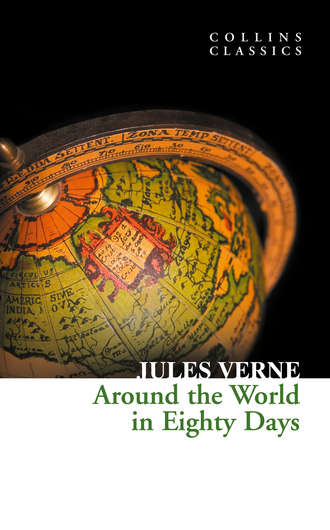
Полная версия
Around the World in Eighty Days
During the first few days, a few bold spirits, principally ladies, were in favour of him, especially after the Illustrated London News had published hispicture, copied from his photograph deposited in the archives of the Reform Club. Certain gentlemen dared to say, “Humph! why not, after all? More extraordinary things have been seen!” These were particularly the readers of the Daily Telegraph. But it was soon felt that this journal commenced to be weaker in its support.
In fact, a long article appeared on the seventh of October, in the Bulletin of the Royal Geographical Society. It treated the question from all points of view, and demonstrated clearly the folly of the enterprise. According to this article, everything was against the traveller, the obstacles of man and the obstacles of nature. To succeed in this project, it was necessary to admit a miraculous agreement of the hours of arrival and departure, an agreement which did not exist, and which could not exist. The arrival of trains at a fixed hour could be counted upon strictly, and in Europe, where relatively short distances are in question; but when three days are employed to cross India, and seven days to cross the United States, could the elements of such a problem be established to a nicety? The accidents to machinery, running of trains off the track, collisions, bad weather, and the accumulations of snows, were they not all against Phileas Fogg? Would he not find himself in winter on the steamers at the mercy of the winds or of the fogs? Is it then so rare that the best steamers of the ocean lines experience delays of two or three days? But one delay was sufficient to break irreparably the chain of communication. If Phileas Fogg missed only by a few hours the departure of a steamer, he would be compelled to wait for the next steamer, and in this way his journey would be irrevocably compromised. The article made a great sensation. Nearly all the papers copied it, and the stock in Phileas Fogg went down in a marked degree.
During the first few days which followed the departure of the gentleman, important business transactions had been made on the strength of his undertaking. The world of betters in England is a more intelligent and elevated world than that of gamblers. To bet is according to the English temperament; so that not only the various members of the Reform Club made heavy bets for or against Phileas Fogg, but the mass of the public entered into the movement. Phileas Fogg was entered like a racehorse in a sort of stud book. A bond was issued, which was immediately quoted upon the London Exchange. “Phileas Fogg” was “bid” or “asked” firm or above par, and enormous transactions were made. But five days after his departure, after the appearance of the article in the Bulletin of the Geographical Society, the offerings commenced to come in plentifully. “Phileas Fogg” declined. It was offered in bundles. Taken first at five, then at ten, it was finally taken only at twenty, at fifty, at one hundred!
Only one adherent remained steadfast to him. It was the old paralytic, Lord Albemarle. This honourable gentleman, confined to his armchair, would have given his fortune to be able to make the tour of the world, even in ten years. He bet five thousand pounds in favour of Phileas Fogg, and even when the folly as well as the uselessness of the project was demonstrated to him, he contented himself with replying: “If the thing is feasible, it is well that an Englishman should be the first to do it.”
The adherents of Phileas Fogg became fewer and fewer; everybody, and not without reason, was putting himself against him; bets were taken at one hundred and fifty and two hundred against one, when, seven days after his departure, an entirely unexpected incident caused them not to be taken at all.
At nine o’clock in the evening of this day, the Commissioner of the Metropolitan Police received a telegraphic dispatch in the following words:
“Suez to London.
“Cowan, Commissioner of Police, Central Office, Scotland Square: I have the bank robber, Phileas Fogg. Send without delay warrant of arrest to Bombay, British India.
“Fix, Detective.”
The effect of this dispatch was immediate. The honourable gentleman disappeared to make room for the banknote robber. His photograph, deposited at the Reform Club with those of his colleagues, was examined. It reproduced, feature by feature, the man whose description had been furnished by the commission of inquiry. They recalled how mysterious Phileas Fogg’s life had been, his isolation, his sudden departure; and it appeared evident that this person, under the pretext of a journey round the world, and supporting it by a senseless bet, had had no other aim than to mislead the agents of the English police.
CHAPTER 6
In which the Agent, Fix, shows a very proper impatience
These are the circumstances under which the dispatch concerning Mr Phileas Fogg had been sent:
On Wednesday, the ninth of October, there was expected at Suez, at eleven o’clock a.m., the iron steamer Mongolia, of the Peninsular and Oriental Company, sharp built, with a spar deck, of two thousand eight hundred tons burden, and nominally of five hundred horse-power. The Mongolia made regular trips from Brindisi to Bombay by the Suez Canal. It was one of the fastest sailers of the line, and always exceeded the regular rate of speed, that is, ten miles an hour between Brindisi and Suez, and nine and fifty-three hundredths miles between Suez and Bombay.
Whilst waiting for the arrival of the Mongolia, two men were walking up and down the wharf, in the midst of the crowd of natives and foreigners who come together in this town, no longer a small one, to which the great work of M. Lesseps assures a great future.
One of these men was the Consular agent of the United Kingdom, settled at Suez, who, in spite of the doleful prognostications of the British Government, and the sinister predictions of Stephenson, the engineer, saw English ships passing through this canal every day, thus cutting off one-half the old route from England to the East Indies around the Cape of Good Hope.
The other was a small, spare man, of a quiet, intelligent, nervous face, who was contracting his eyebrows with remarkable persistence. Under his long eyelashes there shone very bright eyes, but whose brilliancy he could suppress at will. At this moment he showed some signs of impatience, going, coming, unable to remain in one spot.
The name of this man was Fix, and he was one of the detectives, or agents of the English police, that had been sent to the various seaports after the robbery committed upon the Bank of England. This Fix was to watch, with the greatest care, all travellers taking the Suez route, and if one of them seemed suspicious to him, to follow him up whilst waiting for a warrant of arrest. Just two days before Fix had received from the Commissioner of the Metropolitan Police the description of the supposed robber. It was that of the distinguished and well-dressed gentleman who had been noticed in the paying-room of the bank. The detective, evidently much excited by the large reward promised in case of success, was waiting then with an impatience easy to understand, the arrival of the Mongolia.
“And you say, Consul,” he asked for the tenth time, “this vessel cannot be behind time?”
“No, Mr Fix,” replied the Consul. “She was signalled yesterday off Port Said, and the one hundred and sixty kilometres of the canal are of no moment for such a vessel. I repeat to you that the Mongolia has always obtained the reward of twenty-five pounds given by the Government for every gain of twenty-four hours over the regulation time.”
“This steamer comes directly from Brindisi?” asked Fix.
“Directly from Brindisi, where it took on the India mail; from Brindisi, which it left on Saturday, at five o’clock p.m. So have patience; it cannot be behind-hand in arriving. But really I do not see how, with the description you have received, you could recognise your man, if he is on board the Mongolia.”
“Consul,” replied Fix, “we feel these people rather than know them. You must have a scent for them, and the scent is like a special sense, in which are united hearing, sight, and smell. I have in my life arrested more than one of these gentlemen, and, provided that my robber is on board, I will venture that he will not slip from my hands.”
“I hope so, Mr Fix, for it is a very heavy robbery.”
“A magnificent robbery,” replied the enthusiastic detective. “Fifty-five thousand pounds! We don’t often have such windfalls! The robbers are becoming mean fellows. The race of Jack Sheppard is dying out! They are hung now for a few shillings!”
“Mr Fix,” replied the Consul, “you speak in such a way that I earnestly wish you to succeed; but I repeat to you that, from the circumstances in which you find yourself, I fear that it will be difficult. Do you not know that, according to the description you have received, this robber resembles an honest man exactly?”
“Consul,” replied the detective dogmatically, “great robbers always resemble honest people. You understand that those who have rogues’ faces have but one course to take to remain honest, otherwise they would be arrested. Honest physiognomies are the very ones that must be unmasked. It is a difficult task, I admit; and it is not a trade so much as an art.”
It is seen that the aforesaid Fix was not wanting in a certain amount of self-conceit.
In the meantime the wharf was becoming lively little by little. Sailors of various nationalities, merchants, ship-brokers, porters, and fellahs, were coming together in large numbers. The arrival of the steamer was evidently near. The weather was quite fine, but the atmosphere was cold from the east wind. A few minarets towered above the town in the pale rays of the sun. Towards the south, a jetty of about two thousand yards long extended like an arm into the Suez roadstead. Several fishing and coasting vessels were tossing upon the surface of the Red Sea, some of which preserved in their style the elegant shape of the ancient galley.
Moving among this crowd, Fix, from the habit of his profession, was carefully examining the passers-by with a rapid glance.
It was then half-past ten.
“But this steamer will never arrive!” he exclaimed on hearing the port clock strike.
“She cannot be far off,” replied the Consul.
“How long will she stop at Suez?” asked Fix.
“Four hours. Time enough to take in coal. From Suez to Aden, at the other end of the Red Sea, is reckoned thirteen hundred and ten miles, and it is necessary to lay in fuel.”
“And from Suez this vessel goes directly to Bombay?”
“Directly, without breaking bulk.”
“Well, then,” said Fix, “if the robber has taken this route and this vessel, it must be in his plan to disembark at Suez, in order to reach by another route the Dutch or French possessions of Asia. He must know very well that he would not be safe in India, which is an English country.”
“Unless he is a very shrewd man,” replied the Consul.
“You know that an English criminal is always better concealed in London than he would be abroad.”
After this idea, which gave the detective much food for reflection, the Consul returned to his office, situated at a short distance. The detective remained alone, affected by a certain nervous impatience, having the rather singular presentiment that his robber was to be found aboard the Mongolia—and truly, if this rascal had left England with the intention of reaching the New World, the East India route, being watched less, or more difficult to watch than that of the Atlantic, ought to have had his preference.
Fix was not long left to his reflections. Sharp whistles announced the arrival of the steamer. The entire horde of porters and fellahs rushed towards the wharf in a bustle, somewhat inconveniencing the limbs and the clothing of the passengers. A dozen boats put off from the shore to meet the Mongolia. Soon was seen the enormous hull of the Mongolia passing between the shores of the canal, and eleven o’clock was striking when the steamer came to anchor in the roadstead, while the escaping of the steam made a great noise. There was quite a number of passengers aboard. Some remained on the spar-deck, contemplating the picturesque panorama of the town; but the most of them came ashore in the boats which had gone to hail the Mongolia.
Fix was examining carefully all those that landed, when one of them approached him, after having vigorously pushed back the fellahs who overwhelmed him with their offers of service, and asked him very politely if he could show him the office of the English consular agent. And at the same time this passenger presented a passport upon which he doubtless desired to have the British visé. Fix instinctively took the passport, and at a glance read the description in it. An involuntary movement almost escaped him. The sheet trembled in his hand. The description contained in the passport was identical with that which he had received from the Commissioner of the Metropolitan Police.
“This passport is not yours?” he said to the passenger.
“No,” replied the latter, “it is my master’s passport.”
“And your master?”
“Remained on board.”
“But,” continued the detective, “he must present himself in person at the Consul office to establish his identity.”
“What, is that necessary?”
“Indispensable.”
“And where is the office?”
“There at the corner of the square,” replied the detective, pointing out a house two hundred paces off.
“Then I must go for my master, who will not be pleased to have his plans deranged!”
Thereupon the passenger bowed to Fix and returned aboard the steamer.
CHAPTER 7
Which shows once more the uselessness of Passports in Police Matters
The detective left the wharf and turned quickly towards the Consul’s office. Immediately upon his pressing demand he was ushered into the presence of that official.
“Consul,” he said, without any other preamble, “I have strong reasons for believing that our man has taken passage aboard the Mongolia, and Fix related what had passed between the servant and himself with reference to the passport.
“Well, Mr Fix,” replied the Consul, “I would not be sorry to see the face of this rogue. But perhaps he will not present himself at my office if he is what you suppose. A robber does not like to leave behind him the tricks of his passage, and besides the formality of passports is no longer obligatory.”
“Consul,” replied the detective, “if he is a shrewd man, as we think, he will come.”
“To have his passport viséd?”
“Yes. Passports never serve but to incommode honest people and to aid the flight of rogues. I warrant you that his will be all regular, but I hope certainly that you will not visé it.”
“And why not? If his passport is regular I have no sight to refuse my visé.”
“But, Consul, I must retain this man until I have received from London a warrant of arrest.”
“Ah, Mr Fix, that is your business,” replied the Consul, “but I—I cannot—”
The Consul did not finish his phrase. At this moment there was a knock at the door of his private office, and the office boy brought in two foreigners, one of whom was the very servant who had been talking with the detective. They were, indeed, the master and servant. The master presented his passport, asking the Consul briefly to be kind enough to visé it. The latter took the passport and read it carefully, while Fix, in one corner of the room, was observing or rather devouring the stranger with his eyes.
When the Consul had finished reading, he asked:
“You are Phileas Fogg, Esq.?”
“Yes, sir,” replied the gentleman.
“And this man is your servant?”
“Yes, a Frenchman named Passepartout.”
“You come from London?”
“Yes.”
“And you are going?”
“To Bombay.”
“Well, sir, you know that this formality of the visé is useless, and that we no longer demand the presentation of the passport?”
“I know it, sir,” replied Phileas Fogg, “but I wish to prove by your visé my trip to Suez.”
“Very well, sir.”
And the Consul having signed and dated the passport, affixed his seal, Mr Fogg settled the fee, and having bowed coldly, he went out, followed by his servant.
“Well?” asked the detective.
“Well,” replied the Consul, “he has the appearance of a perfectly honest man!”
“Possibly,” replied Fix; “but that is not the question with us. Do you find, Consul, that this phlegmatic gentleman resembles, feature for feature, the robber whose description I have received?”
“I agree with you, but you know that all descriptions—”
“I shall have a clear conscience about it,” replied Fix.
“The servant appears to me less of a riddle than the master. Moreover, he is a Frenchman, who cannot keep from talking. I will see you soon again, Consul.”
The detective then went out, intent upon the search for Passepartout.
In the meantime Mr Fogg, after leaving the Consul’s house, had gone towards the wharf. There he gave some orders to his servant; then he got into a boat, returned on board the Mongolia, and went into his cabin. He then took out his memorandum book, in which were the following notes:
“Left London, Wednesday, October 2, 8.45 p.m.
“Arrived at Paris, Thursday, October 3, 7.20 a.m.
“Left Paris, Thursday, 8.40 a.m.
“Arrived at Turin, via Mont Cenis, Friday, October 4, 6.35 a.m.
“Left Turin, Friday, 7.27 a.m.
“Arrived at Brindisi, Saturday, October 5, 4 p.m.
“Set sail on the Mongolia, Saturday, 5 p.m.
“Arrived at Suez, Wednesday, October 9, 11 a.m.
“Total of hours consumed, 158 1-2; or in days, 6 1-2 days.”
Mr Fogg wrote down these dates in a guide-book arranged by columns, which indicated, from the 2nd of October to the 21st of December—the month, the day of the month, the day of the week, the stipulated and actual arrivals at each principal point, Paris, Brindisi, Suez, Bombay, Calcutta, Singapore, Hong-Kong, Yokohama, San Francisco, New York, Liverpool, London, and which allowed him to figure the gain made or the loss experienced at each place on the route. In this methodical book he thus kept an account of everything, and Mr Fogg knew always whether he was ahead of time or behind.
He noted down then this day, Wednesday, October 9, his arrival at Suez, which agreeing with the stipulated arrival, neither made a gain or a loss. Then he had his breakfast served up in his cabin. As to seeing the town, he did not even think of it, being of that race of Englishmen who have their servants visit the countries they pass through.
CHAPTER 8
In which Passepartout perhaps talks a little more than is proper
Fix had in a few moments rejoined Passepartout on the wharf, who was loitering and looking about, not believing that he was obliged not to see anything.
“Well, my friend,” said Fix, coming up to him, “is your passport viséd?”
“Ah! it is you, monsieur,” replied the Frenchman.
“Much obliged. It is all in order.”
“And you are looking at the country?”
“Yes, but we go so quickly that it seems to me as if I am travelling in a dream. And so we are in Suez?”
“Yes, in Suez.”
“In Egypt?”
“You are quite right, in Egypt.”
“And in Africa?”
“Yes, in Africa?”
“In Africa?” repeated Passepartout. “I cannot believe it. Just fancy, sir, that I imagined we would not go farther than Paris, and I saw this famous capital again between twenty minutes after seven and twenty minutes of nine in the morning, between the northern station and the Lyons station, through the windows of a cab in a driving rain! I regret it! I would have so much liked to see again Père Lachaise and the Circus of the Champs-Elysées!”
“You are then in a great hurry?” asked the detective.
“No, I am not, but my master is. By the bye, I must buy some shirts and shoes! We came away without trunks, with a carpet-bag only.”
“I am going to take you to a shop where you will find everything you want.”
“Monsieur,” replied Passepartout, “you are really very kind.”
And both started off. Passepartout talked incessantly.
“Above all,” he said, “I must take care not to miss the steamer!”
“You have the time,” replied Fix, “it is only noon!”
Passepartout pulled out his large watch.
“Noon. Pshaw! It is eight minutes of ten!”
“Your watch is slow!” replied Fix.
“My watch! A family watch that has come down from my great-grandfather! It don’t vary five minutes in the year. It is a genuine chronometer.”
“I see what is the matter,” replied Fix. “You have kept London time, which is about two hours slower than Suez. You must be careful to set your watch at noon in each country.”
“What! I touch my watch!” cried Passepartout. “Never.”
“Well, then, it will not agree with the sun.”
“So much the worse for the sun, monsieur! The sun will be wrong then!”
And the good fellow put his watch back in his fob with a magnificent gesture.
A few moments after Fix said to him: “You left London very hurriedly then?”
“I should think so! Last Wednesday, at eight o’clock in the evening, contrary to all his habits, Monsieur Fogg returned from his Club, and in three-quarters of an hour afterwards we were off.”
“But where is your master going, then?”
“Right straight ahead! He is making the tour of the world!”
“The tour of the world!” cried Fix.
“Yes, in eighty days! On a wager, he says; but, between ourselves, I do not believe it. There is no common sense in it. There must be something else.”
“This Mr Fogg is an original genius?”
“I should think so.”
“Is he rich?”
“Evidently, and he carries such a fine sum with him in fresh money on the route! And he doesn’t spare his money on the route! Oh! but he has promised a splendid reward to the engineer of the Mongolia, if we arrive at Bombay considerably in advance!”
“And you have known him for a long time, this master of yours?”
“I,” replied Passepartout, “I entered his service the very day of our departure.”
The effect which these answers naturally produced upon the mind of the detective, already strained with excitement, may easily be imagined.
This hurried departure from London so short a time after the robbery, this large sum carried away, this haste to arrive in distant countries, this pretext of an eccentric wager, all could have no other effect than to confirm Fix in his ideas. He kept the Frenchman talking, and learned to a certainty that this fellow did not know his master at all, that he lived isolated in London, that he was called rich without the source of his fortune being known, that he was a mysterious man, etc. But at the same time Fix was certain that Phileas Fogg would not get off at Suez, but he was really going to Bombay.
“Is Bombay far from here?” asked Passepartout.
“Pretty far,” replied the detective. “It will take you ten days more by sea.”
“And where do you locate Bombay?”
“In India.”
“In Asia?”
“Of course.”
“The deuce! What I was going to tell you—there is one thing that bothers me—it is my burner.”
“What burner?”
“My gas-burner, which I forgot to turn off, and which is burning at my expense. Now, I have calculated that it will cost me two shillings each twenty-four hours, exactly sixpence more than I earn, and you understand that, however little our journey may be prolonged—”
Did Fix understand the matter of the gas? It is improbable. He did not listen any longer, and was coming to a determination. The Frenchman and he had arrived at the shop. Fix left his companion there making his purchases, recommending him not to miss the departure of the Mongolia, and he returned in great haste to the Consul’s office. Fix had regained his coolness completely, now he was fully convinced.








